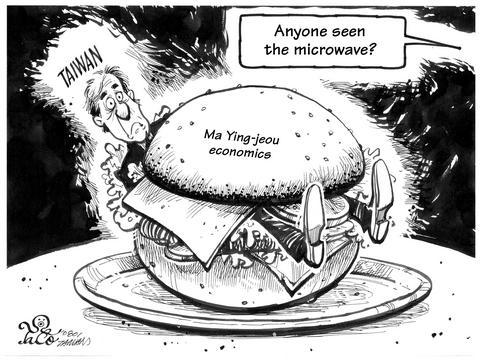¡@
Democracies
bear torch: Chen
¡@
MODEL COUNTRIES: The president lauded Taiwan and South Korea for holding major elections without violence, despite the high levels of controversy surrounding the polls
By Jenny W. Hsu
STAFF REPORTER
Saturday, Jan 26, 2008, Page 3
The democratization of one country can ignite a wave of democracy in the region,
President Chen Shui-bian (³¯¤ô«ó) said yesterday, stressing Taiwan has the
obligation to share its democratization experience with the world's emerging
democracies.
Chen made the remarks at the first annual Global Forum for New Democracies held
by the Ministry of Foreign Affairs, the Presidential Office and the Taiwan
Foundation for Democracy in Taipei.
The forum was attended by five former heads of states from four continents and
addressed the challenges and achievements of emerging democracies.
Chen said democratization was a road riddled with setbacks and successes, citing
the recent political upheavals in Pakistan, Thailand and Kenya.
However, he said, in contrast to the chaos in other young democracies, Taiwan
and South Korea have managed to hold major elections without violence, despite
the high levels of controversy surrounding the elections.
He accused the Chinese Nationalist Party (KMT) of stifling transitional justice
by repeatedly blocking legislation concerning retrieving its stolen party
assets, believed to be worth more than NT$600 billion (US$18.6 billion).
The president called for full disclosure of state-sanctioned violence and other
wrongs that occurred during the KMT regime. Although telling the truth can
damage one's image, it is a crucial factor in achieving forgiveness and
reconciliation, he said.
Francisco Perez, who was president of El Salvador from 1999 to 2004, said
democracy was only as strong as its weakest link.
Without prosperity and security, he said, the people who once fought for
democracy will revert to supporting the institution's greatest enemy --
populism.
Federick Willhem de Klerk, who was president of South Africa from 1989 to 1994
and whose work in ending apartheid won him a Nobel Peace Prize, said a true
democracy must be equipped with an independent judiciary, a clear balance of
powers between the legislature and the executive branches and an objective
media.
Many former leaders shared the view that an unbiased media is a key factor in
promoting and maintaining democracy.
Former Polish president Lech Walesa, another Nobel Peace Prize laureate, who is
making his 11th visit to Taiwan, said any democratic government must establish a
legal framework that ensures civil rights, while the public must learn what
their rights are.
However, he said, the expansion of democratic values in a country also depends
on the "thickness of people's checkbooks."
Kim Yong-sam, president of South Korea from 1993 to 1998, told the forum that a
true democratic leader is someone who humbly follows public will without seeking
to exploit the public.
He said political parties must represent the concerns and needs of the public.
Emil Constantinescu, president of Romania from 1996 to 2000, said an advanced
democratic society is characterized by "political complexity, political
inclusion, a functional market and a wide dispersion of richness, education,
power and authority."
He said that citizens in a democratic country should have access to
organizations that support and encourage diversity.
Former Bulgarian president Zhelyu Zhelev had to cancel his appearance because of
inclement weather at Sofia Airport. Former Mexican president Vincente Fox
canceled his attendance at the request of his government, as Mexico is engaged
in talks with Beijing on stopping shoe dumping.
¡@

¡@